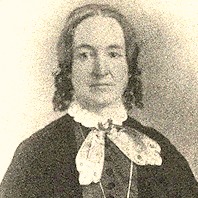- Surname:
- Packard
- First name:
- Elizabeth Parsons Ware
- Era:
- 19th century
- Field of expertise:
- Psychiatry
Social work - Place of birth:
- Ware (USA)
- * 28.12.1816
- † 25.07.1897

Packard, Elizabeth Parsons Ware
American social reformer and women’s rights activist.
Elizabeth Packard (1816–1897) was born in Ware, Massachusetts, as the fifth child of Lucy and Samuel Ware. Two younger brothers followed, but since her older siblings had died at young age, she grew up as the oldest of three children. Elizabeth Packard Ware is considered an early champion against patriarchal arbitrariness and the restriction of women’s rights in late-nineteenth-century America.
On 21 May 1839, she married Calvinist minister Theophilus Packard from Shelburne, Massachusetts, son of a prominent local theologist and educator. The couple had a total of six children, born between 1839 and 1858 (Carlisle 2010: 27 f.). The first twelve years of the marriage seemed uneventful. From 1850, however, tensions arose, in particular, over religious issues. Elizabeth Packard began to advocate a faith influenced by spiritism and based on reason (ibid.: 45). On 18 June 1860, Theophilus Packard had his wife committed to Jacksonville insane asylum, arguing that she was “slightly insane”. While pointing out that she had already been treated at the state asylum in Worcester, Massachusetts, after suffering from a “brain fever” at the age of 19, he was obviously also irritated by his wife’s increasingly independent views and interests.
Asylum experience and Anti-Insane Asylum Society
Diagnosed with “moral insanity”, Elizabeth Packard was to spend the next three years at Jacksonville asylum against her will. But she remained convinced of being sane and supported other patients, for example, by providing them with clothing and bedding. After her release in June 1863, she joined forces with other activists to initiate the Anti-Insane Asylum Society in protest against an asylum system that she deemed “a gross violation of the principles of Christianity, and of mental pathology” (Packard 1871: 144). The members pledged to never agree to asylum committals, be it of themselves or of friends and relatives, to care for each other at home in the event of severe crisis and to establish a fund that could be spent on care. In 1864, Elizabeth Packard was declared sane in a court proceeding. After further legal conflicts with her husband, in the course of which he was awarded the children and the property, she increasingly stood up for the rights of women. In doing so, she also opposed earlier reform efforts by Dorothea Dix, at whose instigation Jacksonville asylum had been established.
Work and achievements
Packard published seven books, including The Great Drama (1878), an autobiographical documentation of her fight against women’s arbitrary committal to mental institutions. The revenue from book sales secured her livelihood, and she was able to buy a house in Chicago. In 1869, her children moved in with her. She drew attention to abuses in local asylums in a total of 15 US states and managed to bring about several changes in laws to safeguard and expand patients’ rights (“Packard Laws”). Elizabeth Packard died in Chicago on 25 July 1897.
Literature
Carlisle, L. V. (2000): “New Notions and Wild Vagaries”: Elizabeth Packard’s Quest for Personal Liberty. In: The Journal of the Illinois State Historical Society 93 (1), pp. 43–66.
Carlisle, L. V. (2010): Elizabeth Packard. A Noble Fight. Urbana: University of Illinois.
Koch-Kanz, S., L. F. Pusch (1999): Elizabeth Packard 1816–1897. Gegen die mutwillige Einweisung von Frauen in Irrenanstalten. In: S. Duda, L. F. Pusch (eds.): WahnsinnsFrauen. 3 vols. Frankfurt/Main: Suhrkamp, pp. 45–73.
Levison, J. R. (2003): Elizabeth Parsons Ware Packard. An Advocate for Cultural, Religious, and Legal Change. In: Alabama Law Review 54 (3), pp. 988–1077.
Murton, M. M. (1995): Behind the “Barred Windows”: The Imprisonment of Women’s Bodies and Minds in Nineteenth-Century America. In: The Women in Literature and Life Assembly of The National Council of Teachers of English 4, pp. 22–26.
Packard, E. P. W. (1864): Great Disclosures of Spiritual Wickedness. New York: Arno.
Packard, E. P. W. (1866): Marital Power Exemplified in Mrs. Packard’s Trial and Self-Defense from the Charge of Insanity; or, Three Years Imprisonment for Religious Belief, by the Arbitrary Will of a Husband, with an Appeal to the Government to so Change the Laws as to Afford Legal Protection to Married Women. Hartford: Case, Lockwood.
Packard, E. P. W. (1871): The Prisoners’ Hidden Life or Insane Asylums Unveiled. Chicago: Clarke.
Packard, E. P. W. (1878): The Great Drama or the Millennial Harbinger. Hartford: Authoress.
Packard, E. P. W. (1886): The Mystic Key, or, the Asylum Secret Unlocked. Hartford: Case, Lockwood & Brainard.
Robin Pape, Burkhart Brückner
Photograph: unknown / Source: Wikimedia / public domain.
Referencing format
Robin Pape, Burkhart Brückner (2015):
Packard, Elizabeth Parsons Ware.
In: Biographisches Archiv der Psychiatrie.
URL:
www.biapsy.de/index.php/en/9-biographien-a-z/303-packard-elizabeth-parsons-ware-e
(retrieved on:02.07.2025)
